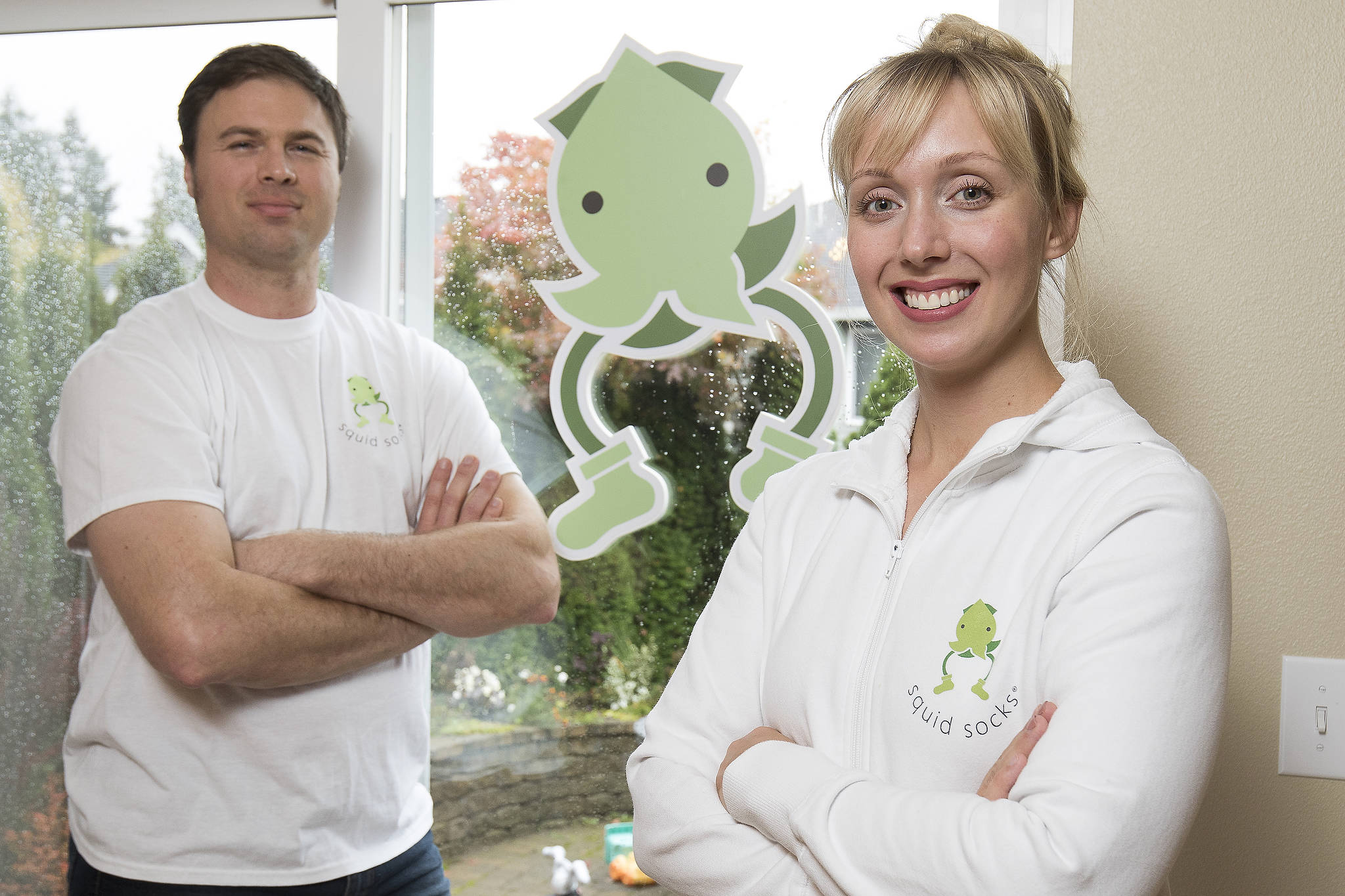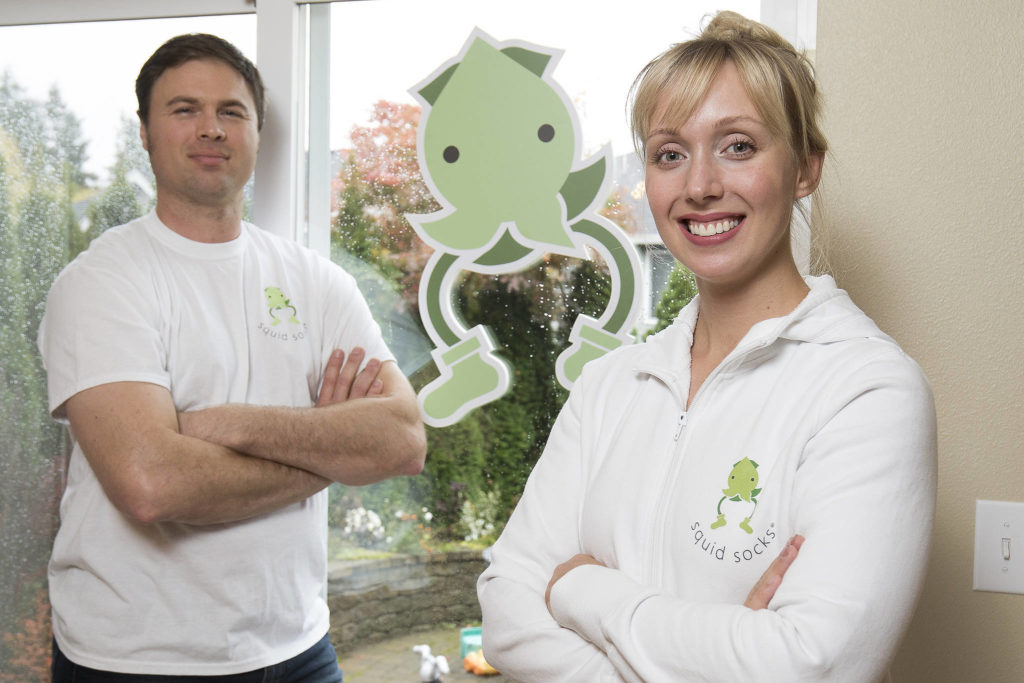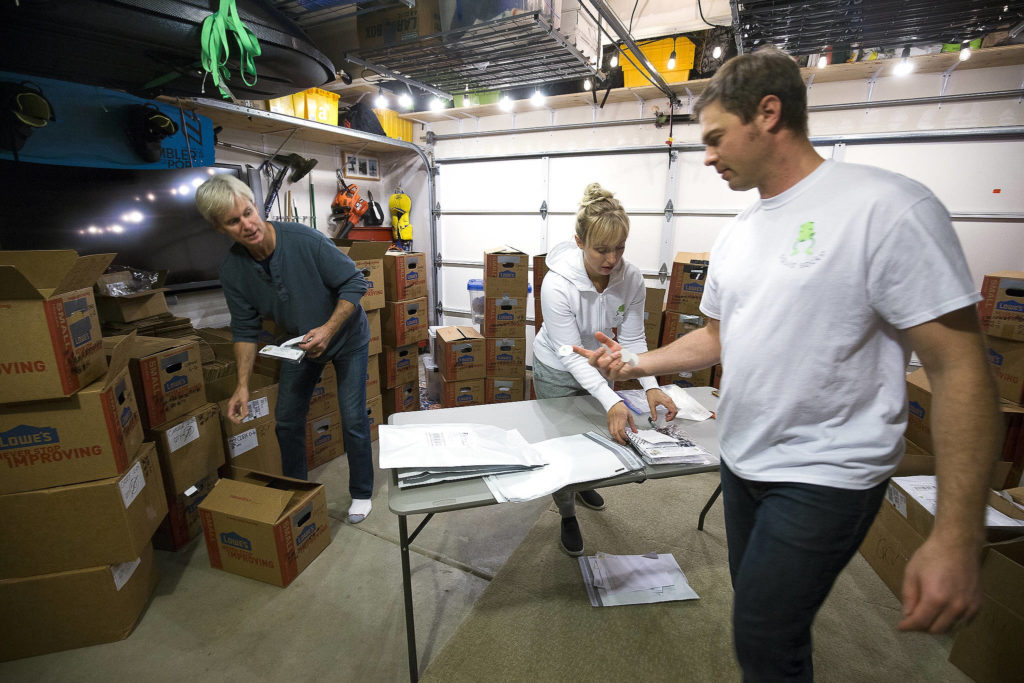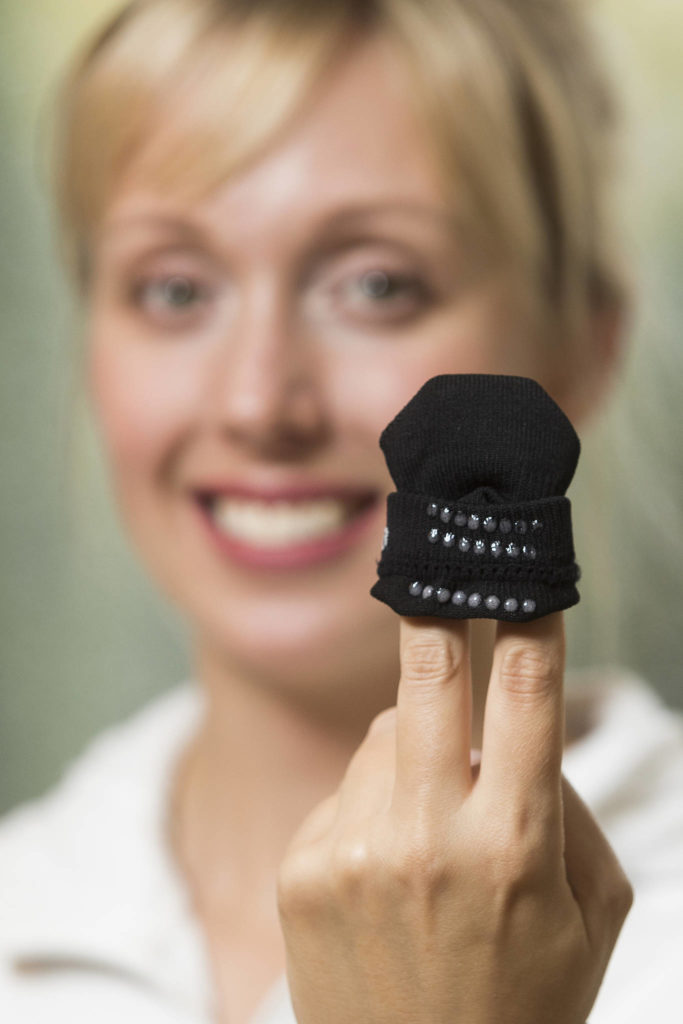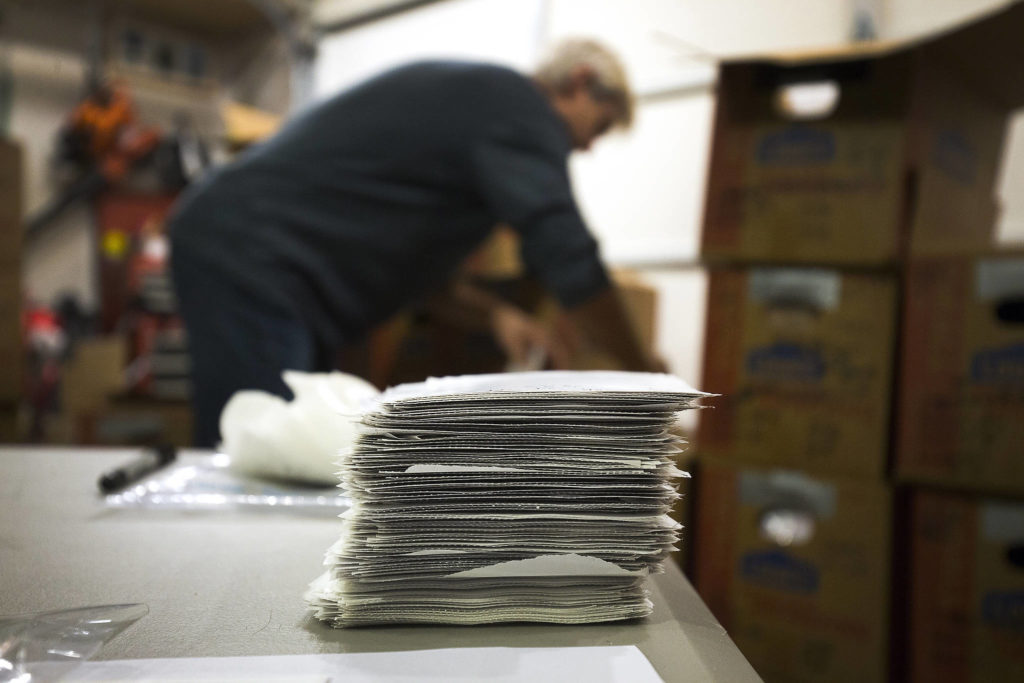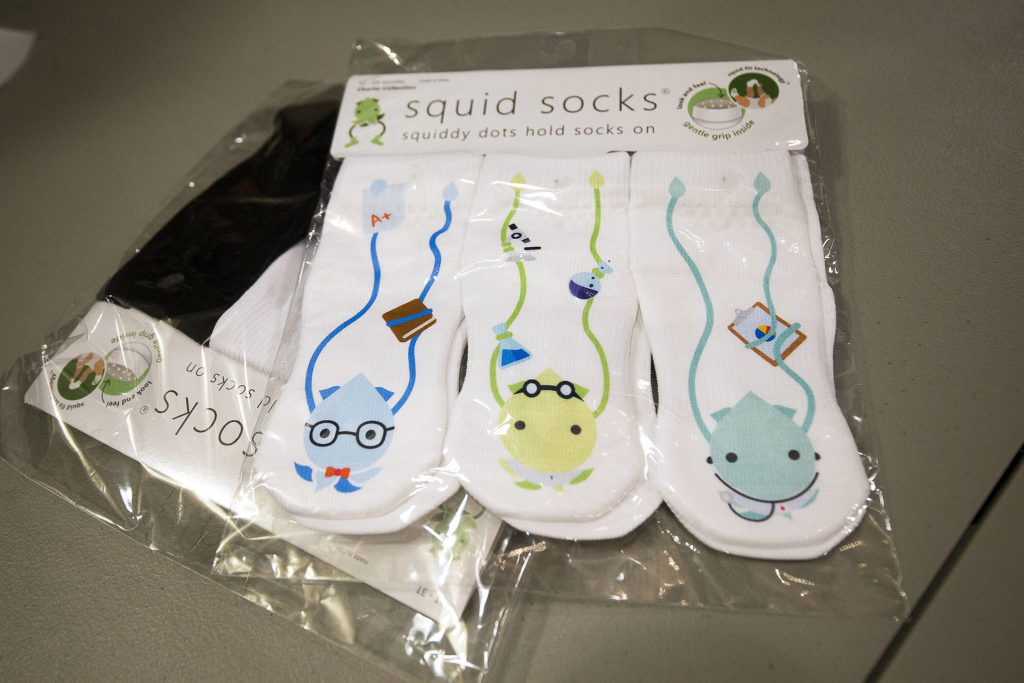EVERETT — On a recent morning, Gabe and Jessica Miller, the founders of Squid Socks, were fretting over an overdue shipment of mesh laundry bags.
Dozens of sock orders had been packaged and stacked on the couch at the couple’s south Everett home, ready to be shipped.
But the late laundry bags had touched off a crisis.
“We like to add a little gift to every order, a sock bag, to keep them together in the wash,” Jessica said.
Should they wait another day in hopes the bags would arrive or ship the orders without them?
“You’re constantly playing a waiting game,” Jessica said. “You have to try and build in that buffer.”
Ever wonder what happens when a business appears on “Shark Tank,” the ABC television show?
The Millers can tell you.
Gabe, an aerospace engineer, and Jessica are the developers of Squid Socks, a line of kids’ socks they say won’t slip off your baby’s or toddler’s feet.
And last month, the couple appeared in an episode of the TV show, filmed earlier this year.
The orders began flowing in.
“Due to the overwhelmingly positive response from “Shark Tank … our Squid Squad is swimming in orders,” the Millers posted on the company website, squidsocks.ink.
The influx has put the crunch on their home-grown business, the main offices of which are the kitchen and a spare room. Since the show’s airing, operations have spilled into the living room.
This particular morning, the couch served as a temporary holding dock. It would have to be cleared by evening so the couple’s two children, Casen, 3, and Claire, 2, would have a place to sit down when they returned from daycare.
To deal with the spike in sales, Gabe, an aerospace engineer at Boeing, took a two-week vacation to fill orders.
The Millers also enlisted help from parents, siblings and friends.
Jessica’s father and mother, Greg and Lisa Raab, pitched in.
Gabe’s parents, Lynn and Lisa Miller, showed up at noon with a hot lunch.
Jessica’s sister, Kristen Raab, was scheduled to arrive at 3 p.m.
“She’s awesome,” Jessica said. “She has a day job and two little kids.”
Deciding whether to wait on the mesh bags was a real concern.
Online purchasers expect their package to be on the doorstep in two or three days. Holding an order for even a day or two can try their patience or send them elsewhere to shop, retail experts say.
“Customers are becoming accustomed to the ability to quickly acquire their goods, and if they aren’t able to acquire it with one retailer, they will move on to another,” advised a blog post on Afflink, a supply chain management service.
Judy Matheson, the owner of J. Matheson Gifts, Kitchen & Gourmet, decided to give Squid Socks some shelf space at her Everett store.
“My daughter used to kick off her socks all the time when she was young. So I thought this was the perfect item,” she said. “These have a non-skid bottom so they can wear them around the house. I know they’ll be a hit,” Matheson said.
In June, when the episode was taped, investor Daymond John offered them $125,000 for a 33% stake.
The investment arrived just in time.
“The account was getting pretty empty,” Gabe said. “We invested our entire savings in the business.”
“We had so many manufacturing problems that we didn’t have money for advertising. We were starved for inventory.”
The couple plans to use the money to restock.
John or his assistant check in every few weeks to gauge progress, the Millers said.
The couple first encountered sock retention problems about five years ago.
On their honeymoon in 2014, they visited Gabe’s cousin, who was complaining about his son’s socks slipping off his feet.
After searching online for a solution and finding none, they decided to try and solve it themselves.
The couple didn’t yet have children of their own, so they enlisted their neighbors’ children to test their products.
“We live in a great (Everett) neighborhood where people have lots of kids,” Jessica said. “We would run to neighbors’ homes and ask to borrow their kids to see if our latest version held up.”
When it came time to christen the company, the silicone-like properties of what else — squids — came to mind.
If Squid Socks looks like an overnight success because of “Shark Tank,” it is not.
When they appeared on the program, they’d invested “hundreds of thousands of dollars” and had sold $40,000 worth of Squid Socks, Gabe said.
Their patent-pending design includes applying dabs of specially formulated silicone — “squiddy dots” — to the inside cuff of each sock.
It took time to get the right silicone formula — one that wasn’t too thin or thick and was skin-safe.
The Millers tapped a Redmond-graphic designer to create squid artwork for the socks.
Because design was on equal footing with function, it took several tries to find the right manufacturer.
A manufacturer’s initial run turned out well. The socks’ silicone dots and the designs, which employ a special printing process, looked good.
It was a promising start.
“Just when you think everything is worked out, there is something that surprises you,” Jessica said.
The manufacturer’s next shipment fell short. They rejected the majority for quality issues.
“We sell these socks for $8 a pair,” Jessica said. “The quality has to be there.”
That meant a search for another manufacturer and nine months to restart production.
“We’re running two startups, our family and Squid Socks. If not for the help of our family, we’d be sunk,” Gabe said.
As for waiting for the mesh bags to arrive, “we did decide to hang on for another few days,” Gabe said. “It’s a little gift that’s an important part of our brand.”
Squid Socks sell for about $24 for three pairs. Their products are available on Amazon.com, Nordstrom.com and through the couple’s website, squidsocks.ink.
Janice Podsada; jpodsada@heraldnet.com; 425-339-3097; Twitter: JanicePods
Talk to us
> Give us your news tips.
> Send us a letter to the editor.
> More Herald contact information.
